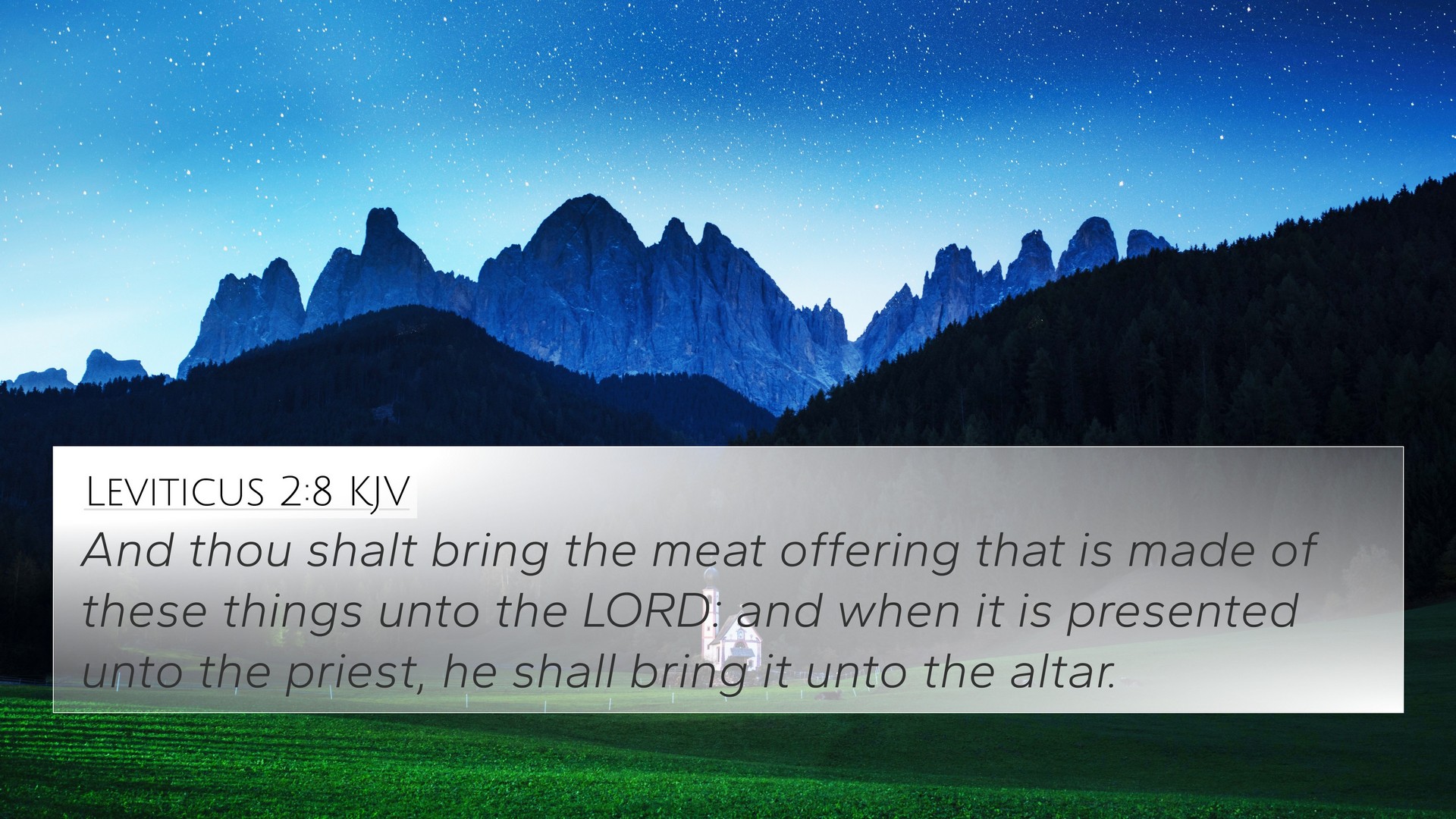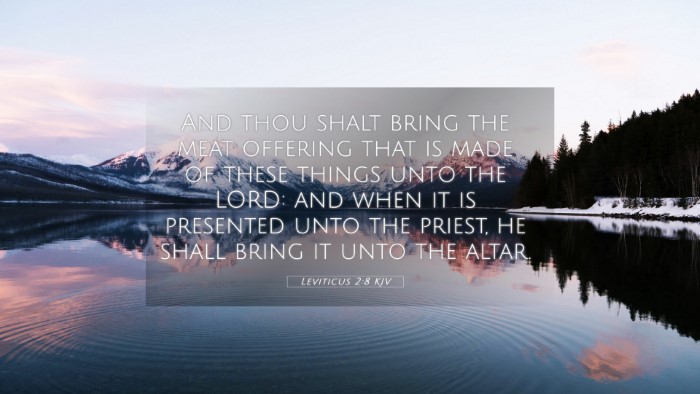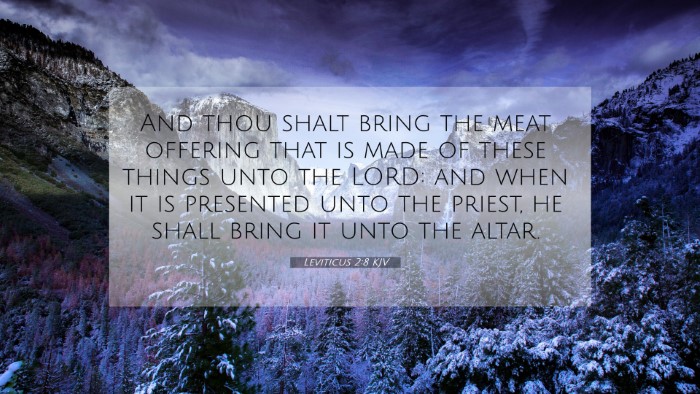Understanding Leviticus 2:8
Leviticus 2:8 states: "And thou shalt bring the meat offering that is made of these things unto the Lord: and when it is presented unto the priest, he shall take from it his handful of the flour thereof, and of the oil thereof, and all the frankincense which is upon the meat offering; and the priest shall burn the memorial of it upon the altar, to be an offering made by fire, of a sweet savor unto the Lord."
Summary of the Verse
This verse describes the process of presenting a grain offering (or meat offering) to the Lord. The offering signifies dedication, gratitude, and acknowledgment of God’s provision. The priest plays a crucial role in mediating between the offeror and God by taking a portion of the offering and burning it on the altar, which creates a "sweet savor" symbolizing acceptance by God.
Insights from Public Domain Commentaries
Matthew Henry's Commentary
Matthew Henry emphasizes the symbolism of the grain offering as a representation of the fruits of the earth. He explains that these offerings were expressions of gratitude to God for His blessings in the harvest. They were integral in maintaining a relationship with God, implying that every good gift comes from Him. Henry also highlights the importance of the priest's role in offering, as it signifies the mediation of Christ, who is the High Priest, offering a sacrifice for humanity.
Albert Barnes' Commentary
Albert Barnes elaborates on the procedures outlined in Leviticus 2, noting the significance of the frankincense as a symbol of worship and a reminder of the prayers of the faithful rising to God. He explains that the burning of the offering points toward the complete dedication of the individual to God, showcasing the need for a sincere heart when approaching the altar. Barnes draws connections to the New Testament by linking these offerings to the ultimate sacrifice of Christ, affirming that the practices of the Levitical system foreshadow the complete redemption found in Jesus.
Adam Clarke's Commentary
Adam Clarke comments on the details of the offering, focusing on the importance of the elements involved—the flour, oil, and frankincense. He asserts that offering these items signifies offering one's very best to God. Clarke notes that the grain offering reflects not only material thanks but also a spiritual state of submission and recognition of God’s provision. His interpretation highlights the themes of gratitude and the necessity for sincerity in worship, indicating how these offerings connect to the heart’s posture before God.
Cross-References and Thematic Connections
Leviticus 2:8 has several cross-references throughout the Bible that enrich understanding and reveal thematic connections:
- Exodus 29:13: Instructions for offerings and the role of the priest.
- Numbers 15:3: The importance of presenting offerings as a sweet aroma to the Lord.
- Hebrews 13:15: The concept of offering praise and good works as sacrifices to God.
- Romans 12:1: Presenting our bodies as living sacrifices which reflects the spirit of the offerings.
- 1 Peter 2:5: Believers are likened to living stones, offering spiritual sacrifices acceptable to God.
- Leviticus 1:9: Discusses the burning of offerings and the aroma to God akin to Leviticus 2:8.
- Philippians 4:18: Paul talks about offerings that are a sweet aroma, acceptable and pleasing to God.
- Psalms 51:17: God's delight in a broken spirit and contrite heart over physical offerings.
Thematic Bible Verse Connections
The themes arising from Leviticus 2:8 connect with various other biblical themes:
- Gratitude: Expressed through offerings across the biblical narrative.
- Divine Provision: Recognition of God's gifts as seen in Deuteronomy 8:10.
- Worship: Offering as a form of worship discussed throughout scripture.
Comparative Bible Verse Analysis
By analyzing Leviticus 2:8 alongside related verses, readers can gain deeper insights into the nature of offerings and sacrifices:
- Leviticus 3: Discusses peace offerings, building on the idea of acceptable offerings.
- Matthew 5:23-24: The significance of reconciliation before presenting gifts to the altar.
Conclusion
Leviticus 2:8 reflects the heart of biblical worship, illustrating the importance of offerings and the priestly role in mediating between humans and God. As believers today engage in similar acts of worship—whether through physical offerings, acts of service, or expressions of praise—they continue to fulfill the essence of this scripture. By recognizing the connections between this verse and others, one gains a broader view of worship as it ties into the greater narrative of redemption and relationship with God.
Tools for Bible Cross-Referencing
For deeper exploration, consider utilizing tools such as:
- Bible concordance for word searches.
- Cross-reference Bible study guides to navigate through scriptures.
- Online Bible study resources for finding thematic links.
- Bible chain references that show connections between verses.


